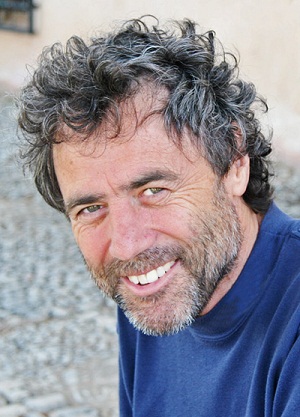
Alan Twigg
Right now we are overburdened with hype about the invasion of e-world publishing.
At BC BookWorld, the middle-brow publication I’ve operated since 1987, we believe in the book, not the ebook. Some technologies do not change: the pillow, the spoon, the wheel. It is conceivable the printed book will remain as one of those sublime technologies.
Meanwhile the viability of the book is currently under siege by cost-cutting propagandists for change; the opinions of people hopping onto the e-bandwagon are being reported hither and yon, and their e-hype is having an enormous impact. It’s time for the silent majority—people who much prefer books—to speak up.
Recently a delegation of about 20 avid teenage readers from around the city of Vancouver met with the board of trustees for the Vancouver Public Library (VPL). The teens were asked if they preferred ebook tablets or books. They all enthusiastically affirmed their clear and strong preference for reading printed books. But where do you see that story reported? Instead we continuously hear from futurists who promote the notion that books will soon be old hat.
The Greeks used to go to caves and ask Oracles to predict the future. There were always priests around to oblige, purporting to be certain. Nowadays many of the prophets of change have a vested interest in the inevitability of ebooks and aggregated book lists. These are the people who are advising us that the invasion of ebook technology will crush conventional book publishing.
Although it might be scientifically feasible to feed oneself intravenously, with a tube, instead of chomping with one’s teeth and swallowing with one’s old-school gullet—thereby saving billions of dollars worth of labor, time and energy—most humans still prefer to eat the old-fashioned way. Replicating our species has not radically altered either, although more efficient scientific methods now exist.
Nearly all the articles we read about the e-revolution emanate from the United States. To address this enormous imbalance, here are some voices from around British Columbia, the province with the highest book reading rate per capita in the country.
1. WE HAVE TO DISTINGUISH BETWEEN INFORMATION CONSUMPTION AND READING
“People would do well to read a story by Isaac Asimov in his I Robot collection,” says Allan Wilson, Chief Librarian of Prince George, “in which the reader thinks he’s talking about a wonderful, new computer that consumes no energy, is made of organic material, is recyclable, and in the end it is—a book.
“Here at the Prince George Public Library we have a Youth Advisory Board (YAB) of computer savvy kids. I polled them and they said they don’t care for ebooks except for cutting and pasting essays, plagiarizing at school, doing work in a fast and glib way, or accessing stuff to answer trivia, and seeking information rather than absorbing thoughts.
“Although they are heavy consumers of social media, they view the library as a human place to meet in person, talk in person, and read the printed word. So we have to distinguish between “information consumption” and “reading.” One is a technical bandwagon that will pass, and the other is a human activity of rumination and enjoyment.
“I undertook a study last year called “Terms of Enjoyment” to see if I could create a social metric around reading behavior and time (as my funders always want justification). Basically, what my young people want is a ‘teen zone,’ an area to socialize, an area with privacy. In other words, they want to avoid Big Brother and all his technical wizardry. They said they get enough of this crap at school. They are experts at manipulating technology, but they want a less hyped-up digital world where all consumption is not measured, and all private moments are not publicized.”
2. E-BOOKS NEGATE EQUALITY OF ACCESS AND TURN LIBRARIES INTO SOCIAL SERVICE GHETTOS
“I am not necessarily wedded to the physicality of the book and print on paper,” says Miriam Moses, Acquisitions Manager for Burnaby Public Library, “but the biggest problem for me is the difficulty in sharing. Libraries shine when they buy things on behalf of the community and everyone has an equal chance to use them. Ebooks drive a stake through the heart of that model.
“Libraries have always offered free inconvenience. When the choice was between going to the library and getting it for free or going to the bookstore and getting it for $40, the library came out pretty well. Now that the choice is between our free inconvenient service and a cheap (at least cheaper than $40) convenient download, many people will opt for the convenience. That isn’t an option for a lot of folks in our community and I fear for the future if it means that libraries lose the middle class and are only serving the marginalized. I know too well what happens to funding of those services over time.
“And then there’s the issue of why ebook selection is my least favorite task. […] When it comes to ebooks, there are issues such as how they are hosted, what ones are available to purchase, what ones aren’t, how much they cost (especially if they’re from Random House), how little they cost if they’re from a religious publisher, etc., how much of a pain in the neck they are to download from the library compared to how easy they are to download when you buy them, who gets to profit…”
3. THE E-BOOK FIX IS IN—IN THE UNITED STATES
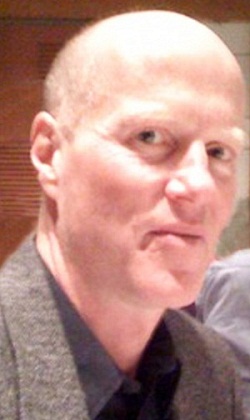
Ron Stadnik
Ron Stadnik of wholesaler Library Bound is worried because there is no viable way for a small Canadian business to enter the e-book market. “When it comes to Canadian libraries,” he says, “whether it’s Vancouver or Bowen Island, they would all like to have buying options, but at this time a single American company called Overdrive has virtually all of the market share. And the more a library decides to spend on ebooks, the less they’ll have left to spend with us.
“Things have always been dire in the book business, but I can never recall a time when there was so little discussion of content in the media, which has been consumed by the delivery system and the business aspects of books and little else of late.
“Too often in the last two years I’ve been at literary events when, surrounded by people talking about their new Kindles & Kobos and iThings, I’ve turned to an author and asked “tell me about your new book” and they’ve just about burst into tears with gratitude because they don’t care about how you read it, they just care about you reading it. They don’t care about Amazon’s business model or DOJ anti-trust lawsuits or battery life, they care about the book.
“I don’t hate ebooks—to do so would be just as absurd as hating large print, mass market, or audiobooks—I just question the current hysteria they’ve occasioned.”
4. THE E-BANDWAGON
“I fear the library has jumped on the bandwagon with ‘e’-everything,” says retired Victoria librarian Barbara Chouinard. “Where I used to work, they claim most of the queries about books have to do with e-books, but I don’t think that is a measure of anything. They do have a lot of ebooks, but not a huge amount, so people ask for them. Real print lovers know how to look up the print copies.
“Of all the librarians I know, there is only one person from Richmond Public Library who prefers ‘non-print.’ No one who pushes for the electronic version of books ever mentions the problems with them. Having your bookmark fall out of a printed book is nothing compared to what they experience. The printed book will survive all of the technological gadgets.”
5. STATE-OF-THE-ART IS TEMPORARY
Donna Hossack is a long-time supporter of the Vancouver Public Library who served on the Board of Friends of the VPL for six years.
“Books and the printed word are timeless, accessible, and have survived through the ages. Allberto Manguel, in his History of Reading, describes viewing a display, in 1984, at the Archeological Museum of Baghdad, of clay tablets from Syria, bearing primitive markings and dating from the fourth millennium B.C. Scrolls with Egyptian hieroglyphs are still extant and being studied by scholars. And yet we discover that our state-of-the-art computers may not be compatible with a word-processing program of just a few years ago.
“Kindle readers are cumbersome and inconvenient to use. On my copy of History of Reading, there are 77 little yellow post-it notes sticking out of the pages, where I have made annotations to the text. How does one attach a sticky-note to a Kindle reader? I cannot envision curling up amongst the pillows with my Kindle to read me to sleep.”
6. YOU CAN’T READ IN AN E-TUB
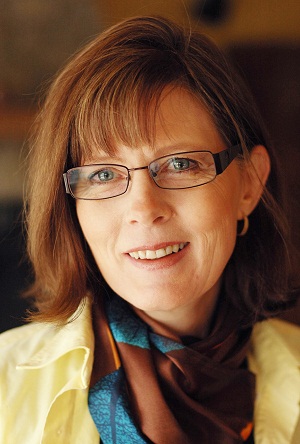
Glynis Whiting
Glynis Whiting of Port Moody, a veteran filmmaker who has her debut mystery novel forthcoming from Thistledown Press, agrees with Hossack. “When I work as a story editor, I find that it’s almost impossible to make notes on my iPad,” says Whiting. “They’ve attempted to devise a technology that imitates Post-It notes, but it’s cumbersome flipping back and forth between pages. I get a sense of pacing in a story by the volume of pages. This is especially true when my reading is interrupted, which is all too often.
“My biggest argument against ebooks is hedonistic. I dare not take my iPad into the bath. I’ve had to purchase one library book because it succumbed to the watery depths. My cousin has had to pay for three—and she’s a librarian.”
7. PORT MOODY HOLDOUT
Terry Stillman owns the Jolly Olde Bookstore in Port Moody, the last used bookstore in the Tri-City area of Port Moody, Port Coquitlam and Coquitlam, with a population of over 218,000 people. He has been a bookseller for more than forty years.
“A few of my customers have confessed to buying, or been given, an e-reader of some kind,” Stillman says. “However, they insist that they only—or mainly—use it for travel.”
“A customer phoned me recently to report that she had heard there was a recent spike in the theft of e-readers left unattended in holiday resort areas… definitely a downside. Who steals a $5 paperback to sell for profit? Another customer told me that on a flight to L.A., the pilot asked for all electronic devices to be turned off for the last half-hour before landing, due to a turbulence problem. Apparently, this notice included e-readers. My customer continued to read her paperback, gloating over the fact that her seatmate finished the trip with nothing to read.
“Some people say their e-reader doesn’t work well in the sun; others complain of eyestrain and headaches; at any rate, for some reason or other, usage of their e-reader seems to be limited, and actual books are still part of their reading regimen. […] I am confident that traditional books will always be in demand by a significant portion of readers.”
8. Features that Fret
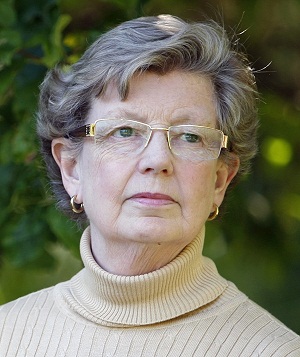
Joan Givner
“I read my first ebook in February,” says biographer and critic Joan Givner of Mill Bay, “and it was an ordeal. Afterwards I sketched out ‘On First Reading A Book on a Kindle’ after Keats’ ‘On First Looking into Chapman’s Homer.’ I particularly disliked being informed that I’d read 25 percent and so on, as if reading was difficult, and I was on a route march and needed signs: only five more miles to go. I found it changed the pace at which I read from a slow meditative process, to a quickened march.
“This lack of page numbers is a problem. Book club members are major book buyers in our time. A friend, who reads the same books I do, routinely borrows my copy after reading the same book on Kindle, because she needs page numbers for group discussion. This applies to texts discussed in the classroom.
“Of course, the aficionados of ebooks will tell you they can do everything but that’s not so. When I read biographies I always begin with the peripheral material—especially the index. I don’t read in a chronological way. I dip in here and there and go backwards and forwards. For these and many more reasons, ebooks are not for me. And yet, I know that ebooks lie in my future like other appendages of old age—canes, walkers, hearing aids. When I can no longer handle small print, an ebook will be a godsend.”
9. YOUNGER GENERATION IS LESS E-BOOK PRONE
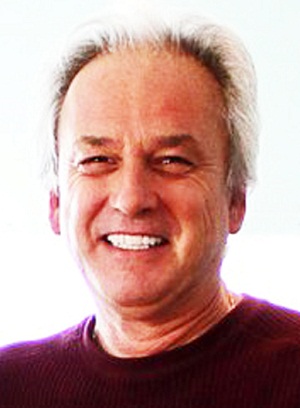
Michael Neill
“I believe the industry and the media are overestimating the eventual impact of ebooks,” says Michael Neill of Mosaic Books in Kelowna. He operates Book Manager, a service that keeps track of sales for dozens of bookstores. “An e-reader is the perfect affordable and cool gift for so many gift givers, but not necessarily for the receivers. Perhaps the massive push over the past two Christmases (and birthday) seasons has gotten us to a decent adoption rate quickly. This means that it may level off or grow more slowly as we move ahead.
“The younger generation is not adopting them nearly as quickly as the 35+ crowd, probably because they do not see them as much as a novelty as those who were not born with gadgets attached to them. Younger people seem to like the physical aspect of the book. It’s more like a novelty to them, something tangible.
“Ebooks will have a decent percentage of the book market but they won’t dominate it, unless too many in the industry incorrectly conclude that the recent growth and excitement will continue its trajectory. If the print infrastructure is damaged too badly (by pessimism), then ebooks will dominate. That message needs to get out there as soon as possible.”
10. PUBLISHING AN E-BOOK
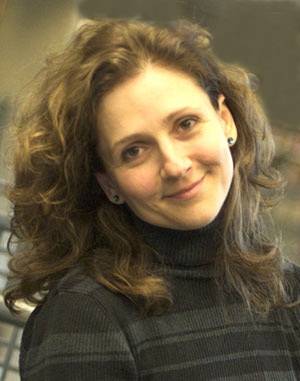
Daniella Elza
To coincide with her Ph.D, Daniela Elza of Vancouver released an ebook in 2011, as a playful rendition of her thesis. “It was quite a bit of work to get it into the ebook format,” she says, “to get the line breaks and the form, which I managed to plow through with the help of my computer whiz husband. Finally, in April last year I sent an email to as many people as I know and launched this virtual baby. Some ventured to get the electronic version of the book. More, however, surprised me by saying they will wait for the paper book.
“This meant more work for me. I ended up publishing a print-on-demand book and ordered copies to sell at readings. Subsequently, I have sold substantially more paper copies than e-copies. When I received the actual book artifact at my door and held it in my hands I viscerally knew the difference between holding a virtual baby and an embodied one. I still delight in the paper artifact. I love it each time I get to touch it. The delight begins with holding it, and not just because my son’s art is on the cover.”
__
At year-end, author and publisher Alan Twigg, www.alantwigg.com, will have completed a two-year stint as a Library Board trustee in Vancouver.


This is such heartening news. As a writer, reviewer, and children’s literature scholar, I spend of lot of time with books. I have suspected for some time that the so-called e-book craze was driven by insecurity on the part of libraries facing diminishing funding (jumping onto the bandwagon before you are left behind) and a disoriented publishing business, struggling to adapt in a time of transition. But I never really bought it – even though I live in the US! While there is definitely a place for digital information sharing and reading, I love the physicality of books. Thank you, thank you, for your real-time, from the front-line, facts.
Thanks Alan and a thank you to each of your contributors as well. I also feel there is a strong future for print books and that many excellent points were made in this article.
I am on a feeding tube 12 hours a day and I resent the comparison between technology which keeps me living and ebook technology, which is a choice. Nevertheless Alan would be a great spokesperson for the music industry, and the horse and buggy industry. Alan is suffering from what Marshal McLuhan refers to as “rearview mirrorism”. New technology disrupts and “numbs” us making us cling to the previous technology. For every avid teenage reader who enjoys books I can find an equal number of teenage readers who enjoy reading on tablets, smartphones etc. Ask any parent. I am not sure where Alan gets his facts in regards to the hordes at the gates ebook hype-sters. Nor why he chose to use the Richard Nixon Spiro Agnew phrasing “silent majority”.
Look I have tons of books. I check out tons of books. I have several tablets. And computers. I read on all of them. I buy poetry books. Much to Daniella Elza’s point, poetry is not adaptable to eReaders or tablets of any kind. I dip into poetry books by random. I leave them laying around everywhere for dipping. I do not experience that with poetry on a tablet which often changes the length of the lines no matter what you do.
I also am developing arthritis which means turning the pages of a book can be difficult. It is much easier to tap a tablet than turn a page. Also Alan, have you seen the joy on the face of an autistic child whose reading and communicating can now be done far easier on a tablet device? Earlier this year I visited the offices of SET-BC which works with technologies to enable children in the school system with disabilities to read and communicate. Which brings me to the most important issue: Access.
Who made you, Alan Twigg, the determiner of how I choose to access information? Are you like the monks of old restricting who can access sacred texts? Are you the gatekeeper of MY reading habits? That makes you the very prophet of change you denounce. You want to change how I access information. Alan, your beef should be with the publishers of information, NOT the readers of information who only wish access in a manner and form which is best suited for their own enrichment. I love books. I horde books. My favourite book store is The Bookman in Abbotsford, a terrific used bookstore that is a terrific recycler of books. Next would be Canadian technological innovation Abe Books, one of the original online (oh there is that technology again!) stores who now ship a number of books for free to Canada.
By the way Alan, how many books does the Vancouver Public Library “weed” out every year? How many do they digitally copy and destroy each year?
Hey Phil. That repetitive horse and buggy comparison was a real hoot. Har har. I imagine you think Alan also wishes he still had to use Canada Post to mail a letter, eh? As far as the music comparison, had you thought about it, you might realize the fundamental difference between print books and physical music (cd, lp, tape, etc). Unlike print, no matter what format music is delivered, the listening experience is essentially the same. The most convenient and cheapest method wins. You also need the appropriate device to make use of a specific music format (have you tried to find a cassette deck for your tapes lately?).
I can’t wait to get rid of my garden and deck plants and replace them with digital holograms when that technology finally become available. Bill Gates was on the right track when he opted for TV monitors in place of real art in his “state of the art” home. I’m was also thrilled a few years back when birthday, get well, graduation and Christmas cards we just a digital click away (we could even program them to happen automatically, how cool). My wife is thrilled each year on our anniversary with my automated “I love you” send directly to her gmail.
As far a getting arthritic, that comes with age, but there are many millions more younger people who don’t have a problem turning pages (they hike, climb mountains and ski too). You see, Alan never once suggested that e-books should be outlawed to prevent the elderly with poor eyesight and arthritis or the handicapped from the enjoyment of reading. I’m not sure what your point was other than to label him as some cruel being to the less fortunate.
If something is truly better in all aspects, then it’s predecessors will become extinct (or near extinct). We can’t imagine relying on candles to light our homes these days, but we still very much enjoy a candlelight dinner, unless perhaps people like you prefer the LED versions (placed next to the vase with plastic flowers).
The main point of the article was that excessive hype can cause cause people (or an industry in this case) to overreact and prematurely abandon a business model. It’s very difficult to rebuild something once the infrastructure is gutted. Downtowns with diversity and a sense of culture and community are en example. The malls and power centres “fixed” them good, unless of course you also prefer to buy everything online and wait inside your bubble at home for stuff to arrive.
I agree that e-books are a wonderful technology in many ways. But to have them replace print books altogether (by way of an abandoned infrastructure) would be very unfortunate because millions of people have a different perspective from you, and I hope that you still find room for diversity. So, relax and enjoy your e-books. I don’t think print books are a threat, and from the sounds of your other comments, you seem to also still find enjoyment browsing the physical stacks, even if you don’t financially support their existence and instead go home to download or buy the physical book from Amazon.
Alan would be a great spokesperson for the music industry, and the horse and buggy industry. Alan is suffering from what Marshal McLuhan refers to as “rearview mirrorism”. New technology disrupts and “numbs” us making us cling to the previous technology. For every avid teenage reader who enjoys books I can find an equal number of teenage readers who enjoy reading on tablets, smartphones etc. Ask any parent. I am not sure where Alan gets his facts in regards to the hordes at the gates ebook hype-sters. Nor why he chose to use the Richard Nixon Spiro Agnew phrasing “silent majority”.
Look I have tons of books. I check out tons of books. I have several tablets. And computers. I read on all of them. I buy poetry books. Much to Daniella Elza’s point, poetry is not adaptable to eReaders or tablets of any kind. I dip into poetry books by random. I leave them laying around everywhere for dipping. I do not experience that with poetry on a tablet which often changes the length of the lines no matter what you do.
I also am developing arthritis which means turning the pages of a book can be difficult. It is much easier to tap a tablet than turn a page. Also Alan, have you seen the joy on the face of an autistic child whose reading and communicating can now be done far easier on a tablet device? Earlier this year I visited the offices of SET-BC which works with technologies to enable children in the school system with disabilities to read and communicate. Which brings me to the most important issue: Access.
Who made you, Alan Twigg, the determiner of how I choose to access information? Are you like the monks of old restricting who can access sacred texts? Are you the gatekeeper of MY reading habits? That makes you the very prophet of change you denounce. You want to change how I access information. Alan, your beef should be with the publishers of information, NOT the readers of information who only wish access in a manner and form which is best suited for their own enrichment. I love books. I horde books. My favourite book store is The Bookman in Abbotsford, a terrific used bookstore.
It’s great to read these various perspectives on the ebook debate.
Great article!
Here’s an interesting excerpt from an article written by Andrew Albanese entitled, “Life with Ebooks” —
“Sarah Houghton, director for the San Rafael (Calif.) Public Library, on her personal blog, Librarian in Black, has gone viral in the library community. The entertainingly written (and laugh-out-loud funny at some points) piece portrays e-books as a bad boyfriend—but Houghton is dead serious in her critique of the dilemma facing libraries.
“Why in hell are we covering for a bad situation? Who gains from us putting a happy face on the dismal e-book situation in libraries?” she asks. “E-books in libraries are a nonstarter, their path has been set for the foreseeable future, and their future is determined by people who are not us.”
Houghton acknowledges that library users want e-books. “But does that mean that we trade away our core values and ethics to provide anything, under any terms? Does it mean that we spend our residents’ limited tax dollars on subpar products with subpar usage terms and no ownership or longevity guarantees?” she asks. “Or is the fact that people want e-books from their libraries and we can’t get them going to turn out to be enough reason to stop the madness and engage in a massive national boycott of the societal conflagration that we are faced with for the future of digital information?”